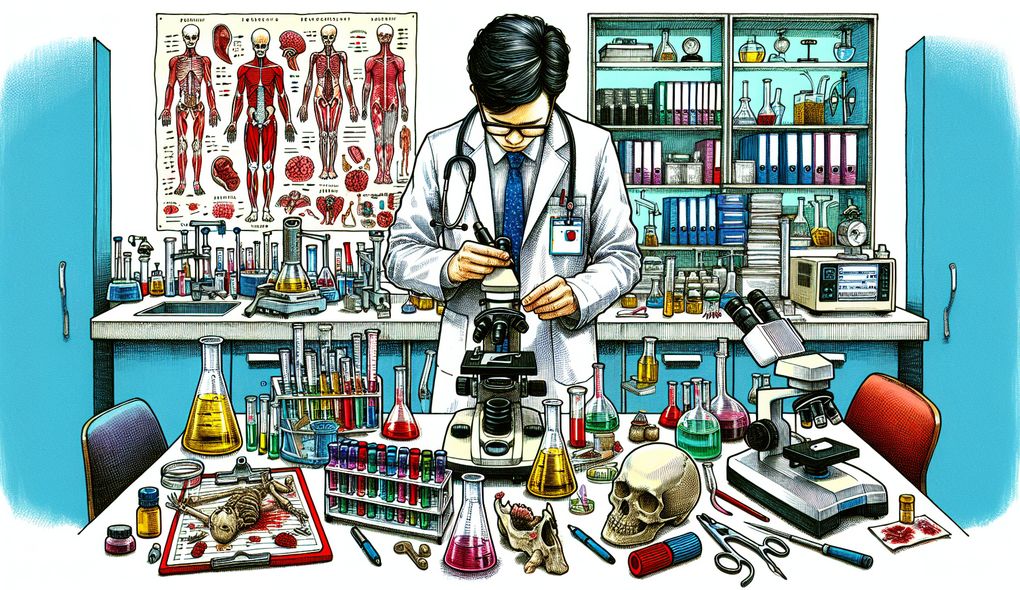Describe a particularly challenging autopsy you performed and the steps you took to reach a conclusive cause and manner of death.
INTERMEDIATE LEVEL

Sample answer to the question:
I once performed a challenging autopsy on a case involving a suspicious death. The body presented with multiple injuries and the cause of death was not immediately apparent. To reach a conclusive cause and manner of death, I meticulously examined the external and internal injuries, collecting samples for further analysis. I collaborated with a team of forensic experts, including toxicologists and ballistics specialists, to review the evidence and gather additional information. Through careful analysis of the injuries and the findings from the laboratory tests, we were able to determine that the cause of death was blunt force trauma to the head. The manner of death was ruled as a homicide. To support our conclusions, I prepared a detailed autopsy report, which was used in legal proceedings. This challenging autopsy required a combination of analytical skills, attention to detail, collaboration, and effective communication to ensure a thorough investigation.
Here is a more solid answer:
During a challenging autopsy, I encountered a complex case involving an unexplained death. The body showed signs of trauma, but the exact cause and manner of death were unclear. To determine the cause, I conducted a systematic examination, focusing on each aspect of the body and collecting samples for analysis. Understanding the significance of a thorough investigation, I utilized my extensive knowledge of human anatomy and pathology to identify and document relevant injuries and abnormalities. To aid in my analysis, I employed advanced laboratory techniques and equipment, ensuring accurate and precise results. Collaborating with a multidisciplinary team of experts, including toxicologists and forensic anthropologists, we shared insights and findings to gain a comprehensive understanding. Through careful analysis and critical thinking, we were able to establish that the cause of death was a rare cardiac anomaly. This required an in-depth understanding of cardiac pathology and a meticulous examination of the heart. To complete the investigation, I documented my findings in a comprehensive autopsy report, providing clear and concise explanations, and participated in court proceedings as an expert witness. This challenging case demonstrated my ability to perform complex autopsies, utilize laboratory equipment effectively, communicate and collaborate with colleagues, and maintain composure in distressing circumstances.
Why is this a more solid answer?
This solid answer expands on the candidate's experience with a challenging autopsy, providing more specific details about their analytical skills, utilization of laboratory equipment, collaboration, and ability to maintain composure. The candidate showcases their expertise in human anatomy and pathology, their meticulous documentation skills, and their ability to communicate effectively and work well with a team. However, the answer can still be improved by providing more specific examples of the candidate's communication and collaboration skills.
An example of a exceptional answer:
I encountered a particularly challenging autopsy during my experience as a Forensic Pathologist. The case involved a suspicious death with limited external signs of trauma. To unravel the mystery, I embarked on a thorough and systematic examination of the body, employing my in-depth knowledge of human anatomy and pathology to identify subtle indicators of internal injuries. Utilizing cutting-edge laboratory equipment and techniques, I collected and analyzed tissue samples, meticulously documenting my findings for comprehensive evaluation. Recognizing the importance of collaboration and diverse perspectives, I engaged with a team of specialists, including forensic toxicologists and radiologists, to gain further insights and validate my conclusions. Through their expertise and collaboration, we discovered evidence of a previously undetected poison, which had contributed to the victim's death. This breakthrough required careful utilization of laboratory instruments and prompt communication with the investigative team. To ensure a conclusive cause and manner of death, I utilized my effective communication and interpersonal skills to present my findings and methodologies during multidisciplinary meetings and court proceedings as an expert witness. The challenging nature of this autopsy highlighted my ability to think critically, adapt to complex situations, utilize state-of-the-art technologies, collaborate effectively, and maintain composure in the face of distressing circumstances.
Why is this an exceptional answer?
This exceptional answer provides a more detailed and comprehensive account of the candidate's experience with a challenging autopsy. The candidate effectively showcases their extensive knowledge of human anatomy and pathology, their proficiency in using laboratory equipment and techniques, their collaboration skills, and their ability to maintain composure. The answer also highlights the candidate's critical thinking abilities, adaptability, effective communication, and problem-solving skills. It goes beyond the basic and solid answers by providing specific examples of the candidate's communication and collaboration abilities, as well as their utilization of state-of-the-art technologies. Overall, this answer demonstrates exceptional skills and expertise in forensic pathology.
How to prepare for this question:
- Brush up on your knowledge of human anatomy and pathology, particularly in relation to autopsy procedures.
- Stay updated with the latest techniques and developments in forensic pathology by attending workshops and conferences.
- Practice critical thinking and problem-solving skills by challenging yourself with complex cases and scenarios.
- Improve your communication and interpersonal skills by engaging in mock presentations and discussions with colleagues.
- Develop a strong attention to detail by maintaining thorough and accurate documentation during autopsies.
- Prepare yourself mentally and emotionally to cope with distressing circumstances and materials commonly encountered in forensic pathology.
What are interviewers evaluating with this question?
- In-depth knowledge of human anatomy and pathology
- Strong analytical and critical thinking skills
- Ability to perform complex autopsies
- Competence in using laboratory equipment and tools pertinent to forensic examination
- Effective communication and interpersonal skills
- Detail-oriented with an aptitude for meticulous documentation
- Capable of maintaining composure and objectivity when exposed to distressing circumstances and materials

